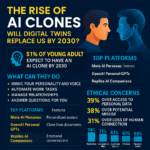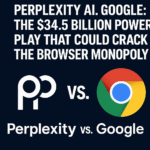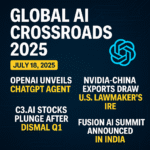Now Reading: OpenAI vs Google: The Battle for Enterprise AI Dominance in 2025
-
01
OpenAI vs Google: The Battle for Enterprise AI Dominance in 2025
OpenAI vs Google: The Battle for Enterprise AI Dominance in 2025

🤖 OpenAI vs Google: The Battle for Enterprise AI Dominance in 2025
Artificial Intelligence is no longer a futuristic buzzword—it’s the core engine of digital transformation in enterprises worldwide. As of July 2025, the two giants in the AI space—OpenAI and Google—are locked in a strategic arms race to dominate the enterprise AI market. On one side, OpenAI pushes forward with its formidable ChatGPT Enterprise and GPT-4o, while Google counters with the cutting-edge Gemini 2.5, a powerful multimodal model tailored for scalable business use.
In this article, we break down the key technologies, adoption metrics, strengths, weaknesses, and market influence of both contenders.
📊 Market Penetration: Who’s Winning the Enterprise Adoption Race?
- OpenAI’s ChatGPT Enterprise is currently used by over 85% of Fortune 100 companies, with Microsoft integrations via Azure and Microsoft 365 Copilot accelerating enterprise reach.
- Google Gemini 2.5 is rapidly gaining ground, with enterprise adoption up 35% quarter-over-quarter, especially in sectors like finance, healthcare, and logistics.
Key Stats (Q2 2025):
- 📈 GPT-4o API usage: 4.3 billion monthly requests
- 🌐 Gemini Enterprise Suite installs: 2.1 million across GCP clients
- 🏢 AI-integrated workflows: OpenAI (63%), Google (57%)

🧠 Technology Comparison: GPT-4o vs Gemini 2.5
| Feature | OpenAI GPT-4o | Google Gemini 2.5 |
|---|---|---|
| Multimodal Inputs | Yes (text, image, audio, video) | Yes (text, image, code, speech) |
| Context Length | Up to 128k tokens | 1M tokens (in enterprise tier) |
| Fine-Tuning | Limited to approved partners | Fully customizable (Vertex AI) |
| Integration | Deeply integrated with Microsoft | Deeply integrated with Google Cloud |
| Enterprise Controls | SOC 2, GDPR, role-based access | ISO 27001, HIPAA, fine-grain access |
| Latency | 300–500ms avg | 100–200ms avg (via Gemini Edge) |
Verdict: Google edges out in latency and token context, while OpenAI dominates in real-world adoption.
🛠️ Key Enterprise Use Cases
🔄 OpenAI
- Customer Support: AI copilots in service desks reduce ticket time by 42%
- Internal Knowledge Assistants: Used for onboarding, policy search, and HR automation
- Document Summarization: Legal and compliance teams save 30+ hours/month
- Real-time Decision Engines: Used in supply chain optimization, banking fraud detection
- Code Intelligence: Gemini for DevOps and SRE teams boosts debugging by 60%
- AI + Workspace: Smart replies, email summarization, and slide auto-generation
⚙️ Deployment & Customization
- OpenAI: Hosted via Azure, limited model tuning; white-labeled options for select partners
- Google: Hosted on GCP; offers custom model training via Vertex AI and fine-tuning interfaces
Scalability Note: Gemini 2.5 enables parameter routing for Mixture-of-Experts—reducing costs by 38% in long-query enterprise environments.
💰 Pricing & Accessibility
- ChatGPT Enterprise: Starts at $60/user/month with volume discounts; Azure consumption-based API pricing
- Gemini Enterprise: GCP-based usage billing; Workspace AI tools bundled for free with enterprise tiers
ROI Insight: According to IDC, companies using Gemini Suite report a 19% higher productivity gain than baseline models.
📉 Challenges & Limitations
- OpenAI: Limited regional deployments (due to Azure footprint); less transparent customization roadmap
- Google: Concerns about data handling in regulated sectors (especially outside the US/EU)
Both face scrutiny regarding AI explainability, hallucinations, and regulatory compliance under new EU and US AI Acts.
🔮 Outlook: What’s Next in the Enterprise AI War?
- OpenAI is rumored to launch GPT-5 Enterprise Edition by Q4 2025 with autonomous workflow chaining
- Google is preparing Gemini 3.0, focusing on on-device enterprise inference and private cloud deployment
Conclusion: The enterprise AI battlefield is intensifying. OpenAI currently leads in real-world adoption and partner reach, while Google builds aggressive momentum through technical performance and infrastructure integration.
📌 Stay with Ai24-News.com for exclusive updates, interviews with enterprise leaders, and deep dives into the evolving war for AI dominance.






























